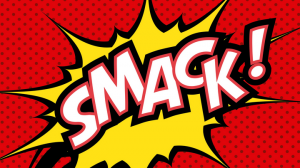Benchslap Of The Day: Turnabout Is... Painful
"Indeed, if the Court were forced to sanction anyone, the Court would sanction.... [the sanction seeker]."
 Getting sanctions imposed on your opposing counsel can be difficult at times. Judges generally don’t want to be in the position of playing hall monitor; unless something is truly egregious, they’ll often let it pass. Indeed, some critics argue that judges should be more willing to impose sanctions, in an effort to improve the standards of the legal profession.
Getting sanctions imposed on your opposing counsel can be difficult at times. Judges generally don’t want to be in the position of playing hall monitor; unless something is truly egregious, they’ll often let it pass. Indeed, some critics argue that judges should be more willing to impose sanctions, in an effort to improve the standards of the legal profession.
It’s especially hard to get your opposing counsel hit with sanctions when… the judge thinks you are the one who ought to be sanctioned. From a saucy order just issued by Judge Patrick J. Schiltz (D. Minn.):
This matter is before the Court on the motion of defendant Messerli & Kramer P.A. (“Messerli”) to sanction plaintiff Jennifer Bendickson for refusing to voluntarily dismiss her complaint within six days after receiving a letter from Messerli explaining why Messerli thought the complaint was meritless. Messerli asks the Court to order Bendickson to pay its attorney’s fees, the lion’s share of which were incurred in bringing this motion for sanctions. Because it was the filing of this motion-and not Bendickson’s refusal to dismiss her complaint-that was “unreasonabl[e] and vexatious[],” 28 U.S.C. § 1927, the Court denies the motion.

Curbing Client And Talent Loss With Productivity Tech
Ouch. But maybe not shocking; as we’ve noted before, Judge Schiltz isn’t afraid to call things as he sees them (not unlike his former boss, the late Justice Antonin Scalia). In the words of our tipster, “I love Judge Schiltz. He’s famously a breath of fresh air.”
Here’s a bit more from Judge Schiltz about why Messerli incited his ire:
Indeed, if the Court were forced to sanction anyone, the Court would sanction Messerli, not Bendickson. It is probably true, as Messerli repeatedly points out, that it acted within its rights in refusing to provide [a relevant] recording to [opposing counsel Bennett] Hartz and in running to court. But the question of what a lawyer has a right to do is not the same as the question of what a lawyer should do. This Court expects that members of its bar will treat each other civilly and make every effort to resolve disputes before inflicting costs on their own clients, their opponents, and the Court. Messerli’s behavior fell well short of this expectation.
It should come as no surprise that Judge Schiltz places a premium on civility. He’s the author of a widely read article for the Vanderbilt Law Review, “On Being a Happy, Healthy, and Ethical Member of an Unhappy, Unhealthy, and Unethical Profession.” (For a summary of the piece’s key points, see this synopsis by Sam Glover.)
Sponsored

How The New Lexis+ AI App Empowers Lawyers On The Go

Happy Lawyers, Better Results The Key To Thriving In Tough Times

Law Firm Business Development Is More Than Relationship Building

AI Presents Both Opportunities And Risks For Lawyers. Are You Prepared?
What do you think of this benchslap? Was it justified, in your view? Flip to the next page to read the full order, which recites the complete circumstances, and judge for yourself.
On Being a Happy, Healthy, and Ethical Member of an Unhappy, Unhealthy, and Unethical Profession [Vanderbilt Law Review]
Earlier: This Attorney’s Unbelievably Brazen Effort To Avoid Paying Sanctions Earns Contempt Holding
David Lat is the founder and managing editor of Above the Law and the author of Supreme Ambitions: A Novel. You can connect with David on Twitter (@DavidLat), LinkedIn, and Facebook, and you can reach him by email at [email protected].
Sponsored

Curbing Client And Talent Loss With Productivity Tech








